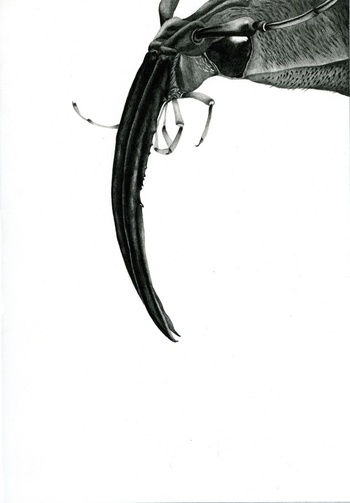In “The Object and His Father: A Bug Story”, Aleksandra Chaushova delves very deeply into the blurry areas between fact and fiction that her exquisite drawings inhabit.
Next spring, Museum M in Leuven is devoting a solo exhibition to Aleksandra Chaushova. We’re not surprised. The Bulgarian artist, who moved to Brussels from her homeland in 2010, after being invited to take part in the residency programme at Wiels, makes brilliant work. It is both technically flawless and surprising because it employs this almost scientific precision in images that tilt (historical) reality and thus expose its substructure. It is like inspired fiction that represents the inspired fiction that we live.
This is also true of her show at Jozsa Gallery, where “The Object and His Father: A Bug Story” presents what initially appears to be an alienating experience. You are guided around a series of drawings of insects that are meticulously precise but some of which are in strange positions (wearing coats or, chameleon-like, enveloped in the patterns of their surroundings) and occasionally flanked by short, confusing phrases. We read, for example: “For the operational worker: a message with text ‘the materials are here, call me.’” Or: “He signs his reports with the pseudonym ‘Nicolas’”.
At the end of the exhibition – which also refers to an “object”, “his father”, and the “Operation Weeds” – you find a television screen set up at the window. Outside and inside, outlook and insight, are mirrored. This turns out to be a metaphor for the grey zones between reality and underlying truths, veil and face, fact and fiction, which are so prominent in Chaushova’s work.

On the screen, you can watch a looped video of a conversation between the artist and Tchavdar Tepeshanov. He used to work for the Bulgarian State Security, as an employee – never as an agent, he insists – during the country’s communist rule. In the recording, Tepeshanov talks about his role in the State Security’s web and about wiretapping (the “bugs”) by agents, who wrote under pseudonyms. These were activities that he coordinated, but which were ordered by the party’s Central Committee. The “liquidation” of the institution makes him sad: “They put the blame on us, as if the hammer is to blame and not the hand holding it.”
Behind the veil
In the tensile relationship between the public and the underground state, where people are not who they are, Aleksandra Chaushova highlights the mechanisms that drape an acceptable veil over reality: the objectification of language (“objects”, “weeds”) that justifies the unjustifiable. The way a regime marches bloody footprints through a society but erases them at the same time.
Aleksandra Chaushova presents powerful work here that is complex and layered. It is also work that must be very demanding of its creator. In this sense, the meticulous detail of her drawings seems like a way to force the process to slow down. Time as a precondition to digest and translate what you want to say and mean. Subtle, through drawings that speak in strange tongues. More literal, through the recording, that lifts the veil of metaphor off reality. And finally, at the very end of the video, razor-sharp, in a moment that gives you chills: “But I can’t understand, in fact, why are you personally interested in all that?” At that moment, the subject “appears” and the picture goes black.
Read more about: Elsene , Expo , Jozsa Gallery , Aleksandra Chaushova
Fijn dat je wil reageren. Wie reageert, gaat akkoord met onze huisregels. Hoe reageren via Disqus? Een woordje uitleg.